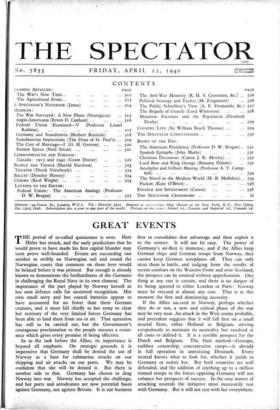GREAT EVENTS
THE period of so-called quiescence is over. Herr Hitler has struck, and the early predictions that he would prove to have made his first capital blunder may soon prove well-founded. Events are succeeding one another so swiftly on Norwegian soil and round the Norwegian coasts that comment on them here would be belated before it was printed. But enough is already known to demonstrate the foolhardiness of the Germans in challenging the Royal Navy in its own element. The importance of the part played by Norway herself in her own defence calls for unstinted recognition. Her own small navy and her coastal batteries appear to have accounted for no fewer than three German cruisers, and it must fall chiefly to her army to clear her territory of the very limited forces Germany has been able to land there from sea or air. That operation has still to be carried out, but the Government's courageous proclamation to the people ensures a resist- ance which gives every promise of being effective.
As to the task before the Allies, its importance is beyond all emphasis. On strategic grounds it is imperative that Germany shall be denied the use of Norway as a base for submarine attacks on our shipping and air attacks on our ports. We may be confident that she will be denied it. But there is another side to that. Germany has chosen to drag Norway into war. Norway has accepted the challenge, and her ports and aerodromes are now potential bases against Germany, not against Britain. It is our business first to consolidate that advantage and then exploit it to the utmost. It will not be easy. The power of Germany's air-fleet is immense, and if the Allies keep German ships and German troops from Norway, they cannot keep German aeroplanes off. They can only meet them in battle, and judging from the results of recent combats on the Western Front and over Scotland, the prospect can be awaited without apprehension. One thing at any rate is certain, and there is no danger of its being ignored in either London or Paris : Norway must be rescued at almost any cost. That is at this moment the first and dominating necessity.
If the Allies succeed in Norway, perhaps whether they do or not, a new and critical phase of the war may be very near. An attack in the West seems probable, and precedent suggests that it will fall first on a small neutral State, either Holland or Belgium, striving scrupulously to maintain its neutrality but resolved at all costs to defend it. It is a terrible prospect for the Dutch and Belgians. The Nazi method—Gestapo, ruthless censorship, concentration camps—is already in full operation in unresisting Denmark, Every neutral knows what to look for, whether it yields to Germany or resists her. But both countries are well defended, and the addition of anything up to a million trained troops to the forces opposing Germany will not enhance her prospects of success. In the easy matter of attacking neutrals the initiative must necessarily rest with Germany. But it will not rest with her everywhere.


































